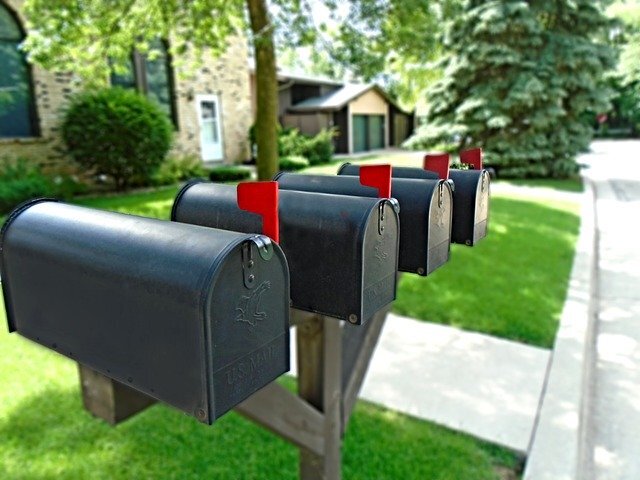The United States Postal Service is an independent agency of the executive branch of the United States federal government. It is responsible for providing postal service in the United States. The USPS is one of the few government agencies explicitly authorized by the United States Constitution. As of 2019, the USPS has 469,934 career employees and 136,174 non-career employees. It is by geography and volume the largest postal system in the world. The USPS delivers approximately 47% of the world's mail.
The Department of Defense and the USPS jointly operate the Army Post Office (for postal services to the Army and Air Force ) and the Fleet Post Office (for Navy, Marine Corps, and Coast Guard postal services).
Benjamin Franklin was appointed the first postmaster general in 1775 during the Second Continental Congress. The Post Office was created in 1792 with the passage of the Postal Service Act. It was elevated to a cabinet-level department in 1872. It was transformed by the Postal Reorganization Act of 1970 into the United States Postal Service and became an independent agency.
Since the early 1980s, except for subsidies for costs associated with disabled and overseas voters, the federal government has reduced or eliminated many direct tax subsidies to the USPS.
The Postal Service is legally obligated to serve all Americans, regardless of where they live, at uniform price and quality. An apartment dweller in a large city living next door to a post office pays the same postage as a rural farmer who lives down a dirt road 20 miles from the nearest post office. The Post Office has exclusive access to all letterboxes marked "U.S. Mail" and personal letterboxes in the United States. For private package delivery, they are in competition with private package delivery services, such as FedEx, United Parcel Service, and Amazon. FedEx, UPS, and Amazon are not obligated to deliver to all areas of the United States and often use The USPS to deliver packages to rural and hard to access locations. They can vary their rates according to the location and difficulty of the delivery.
Starting in the 1990s, Republicans began promoting the idea of privatizing the U.S. Postal Service.
The Bush Administration passed the Postal Accountability and Enhancement Act of 2006 (PAEA) which obligates the USPS to fund the present value of earned retirement obligations ten years in advance. This creates an unusually steep cash outlay for USPS which decimates their profit margin. Private U.S. businesses are under no legal obligation to prepay retirement costs, but about one quarter do.
The Obama Administration investigated the feasibility of privatizing the USPS, but ultimately decided privatization would not benefit the American people.
The Trump administration proposed turning the USPS into "a private postal operator" as part of a June 2018 governmental reorganization plan. The administration faced strong bipartisan opposition to the idea in Congress.
In 2020, operational policy changes implemented by new Postmaster General Louis DeJoy precipitated the 2020 United States Postal Service crisis.
In recent years, many senior citizens and veterans routinely receive prescription drugs through the mail. Delays in receiving these medications are dangerous and could be fatal. Privatization of the USPS could allow the price to deliver these medicines to skyrocket. DeJoy’s operational policy changes have caused significant delays in the delivery of prescription drugs and other packages which has been costly to small businesses around the country who rely on the USPS to deliver goods quickly at affordable prices.
Under the Mail Cover Program, USPS photographs the front and back of every piece of U.S. mail as part of the sorting process. Law enforcement agencies can obtain address information and images of the outsides of mail as part of an investigation without a warrant. This process has been hindered by the removal of sorting machines from hundreds of post offices across the country.
On August 7, 1775, Benjamin Franklin founded the United States Postal Inspection Service (USPIS). It is one of the oldest law enforcement agencies in the United States. The mission of the USPIS is to protect the Postal Service, its employees, and its customers from crime and protect the nation's mail system from criminal misuse.
Postal Inspectors enforce over 200 federal laws relating to mail fraud and criminal misuse of the mail. Postal Inspectors have successfully helped expose child pornographers, human traffickers, drug dealers, and terrorist organizations.
In addition to payroll, benefits, pensions, building, and equipment upkeep the USPS must pay for fuel and vehicles to deliver the mail. Every penny increase in the national average price of gasoline costs the USPS an extra US$8 million per year to fuel its fleet.
The USPS operates one of the largest civilian vehicle fleets in the world, with an estimated 227,896 vehicles. In 2009, USPS vehicles used 444 million gallons of fuel at a cost of US$1.1 billion. Many of its vehicles are right-hand drive to give drivers the easiest access to roadside mailboxes. Many rural letter carriers and all contractors use personal vehicles.
The majority of these fleet vehicles are Chevrolet/Grumman LLV (long-life vehicle), and the newer Ford/Utilimaster FFV (flex-fuel vehicle). These vehicles were made between 1987 and 1994. They have no air conditioning, no airbags, no anti-lock brakes, and inadequate space for the modern volume of e-commerce packages. These vehicles are unsafe and inadequate to handle the changing volume of mail the USPS delivers and must be replaced.
The Grumman fleet ended its expected lifespan in the fiscal year 2017. The process to replace these vehicles started in 2015. Prototypes to replace the Grumman were produced by various bidders, but as of May 2020, a final contract for replacement trucks has not been awarded.
The COVID-19 pandemic has placed a huge strain on the resources of the USPS in terms of safely delivering the mail and protecting its workers. Couple this with the prepaid pension requirements, the elimination or reduction of many federal tax subsidies for the USPS and you have a serious problem.
Polling places in key areas have been closed because of the limited availability of polling place volunteers. This can easily disenfranchise large groups of voters who lack transportation to get to the alternate polling locations and will require voters to wait for hours in lines potentially increasing their risk of contracting COVID-19 and exposing vulnerable family members to the virus.
Being able to safely vote by mail is important for millions of voters including people who are most vulnerable to the effects of the virus such as senior citizens, people with serious medical conditions, and their caregivers. Five states - Oregon, Washington, Colorado, Utah, and Hawaii conduct their elections completely by mail and have experienced negligible voter fraud proving the system works. United States service people stationed all over the world send absentee ballots by mail as do U.S. citizens living abroad, people with physical challenges, and people who will be traveling for work and unable to get to their polling places on election day.
Attacks on the delivery capability of the USPS by removing sorting machines and removing/locking collection boxes must stop and be reversed. The USPS is fully capable of handling the volume of mail-in ballots if allowed to do so without interference by an administration that seeks to privatize the USPS.
Sources for this article: https://en.wikipedia.org/wiki/United_States_Postal_Service












